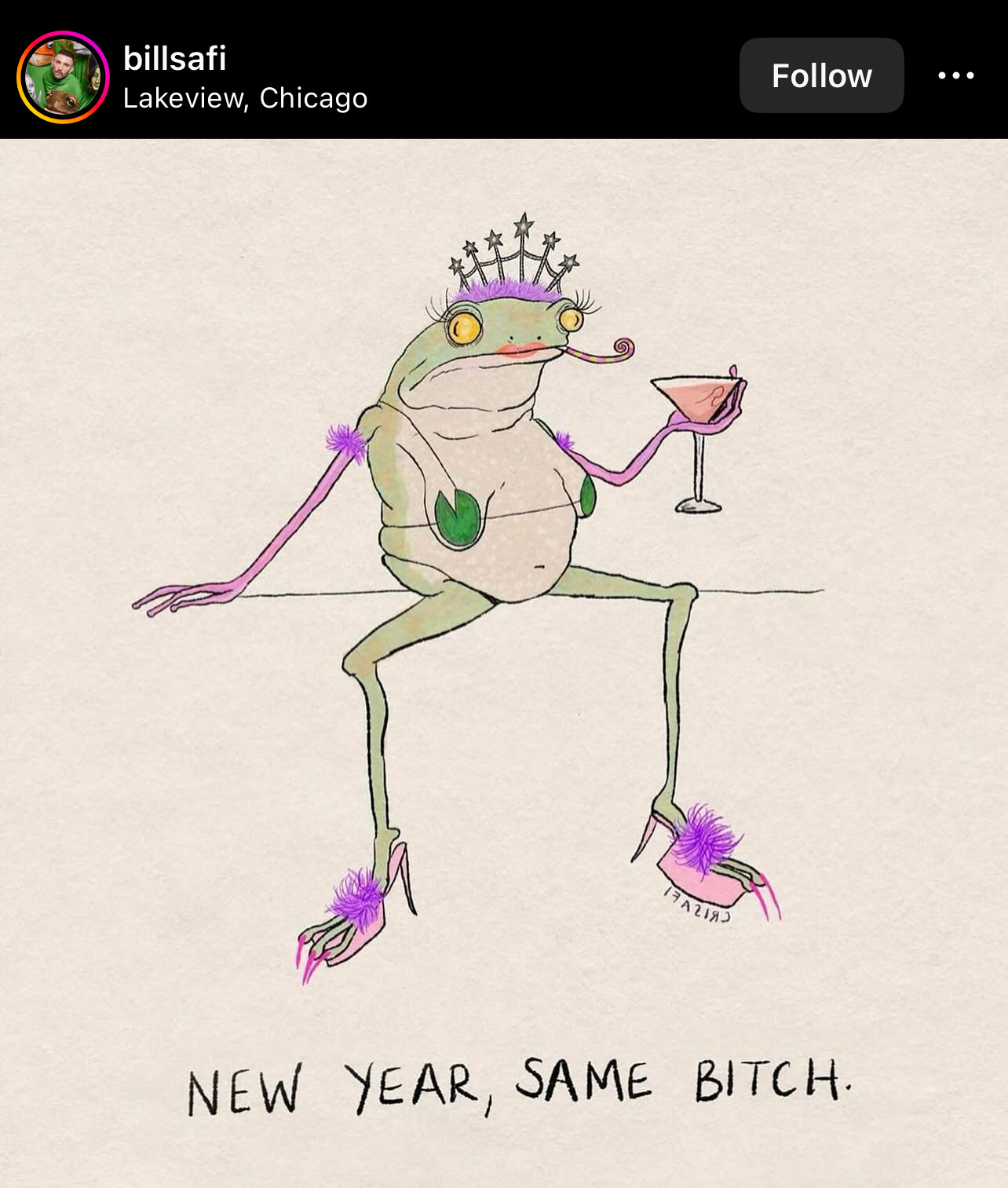Around this time of year, I feel like that meme of Kim Kardashian peering out from behind the hedges.
How’s everyone doing? Are we steeped in the ‘new year, new you’ verbiage? Narrowly dodging the endless barrage of highlight reels on social media?
Or perhaps leaning in to these trends? Soaking in and reflecting on the lessons of the year, and aiming to spend the next year with slightly different behaviors in your corner?
Either is valid, and I’ve spent some years in one camp, some in the other, and some years straddled in between. Regardless of where you stand, there does seem to be a peculiar pulse this time of year. A strange combination of time moving like molasses, though with heightened pressure.

Each time I sign onto social media, I’m greeted with the trending audios and the supplement sales. The highlights that make me question if I did ‘enough’ this year. Or the pull of over-consumption tugging at my sleeve, wondering if I should buy another sweat suit or skincare salve.
It’s quite easy to fall into the despair-ison trap, ie the despair that inevitably follows comparing our lives to strangers on the internet. Feeling like change is mandatory just to keep up.
I find this time of year to be the worst time to focus on change and goal setting, actually. Getting through the holiday season is exhausting. It’s dark at 4pm. Often stress is higher, and sleep patterns have shifted. Maybe there’s more travel. Maybe there’s more spending, or eating a bit differently.
This sets the stage for fatigue and low motivation, all of which make behavior change much more challenging.
(And it’s probably why <10% of folks who set goals this time of year end up following through with them.)
For me, it tends to be the time of year I turn inward, rather than making outward evolution. Or time spent in reflection, similar to last year’s newsletter post about the year in review.
I don’t tend to be all too action forward in January, and instead prefer starting the new year the Roman way, around March. This makes a bit more sense - things are brighter, more effervescent and coming back to life. I therefore have more energy.
So perhaps this time of year is for warming up the kettle. Offering tea, slowing down, and reflecting. So that if and when a call for change is heard, it’s audible as a whisper, rather than a roar.

On this point, I think a lot about the ability to evolve in my day-to-day.
Many of my waking hours are spent chatting with folks and gauging motivation for change. And in my years now working, I’ve been able to identify a few factors that lead to sustainable health promoting behavior change.
This was a topic milled and mulled over at the Integrative Medicine symposium, which I attended last February. I found many of the lectures polarizing and intense, though there was one I really appreciated.
It was hosted by Kenneth Pelletier, MD, PhD, titled Change your Genes - Change your Life: Epigenetics of Longevity.
I’ve shared this in a newsletter before, though I think it’s worth mentioning again. His tenets still make me laugh because of how unserious they were. It all felt very brat in the best of ways (new year, same me - desperately trying to be grandmothered into Gen Z).
Dr. Pelletier’s longevity bullet points include the following:
mediterranean diet - fish but little or no red meat or poultry
smoking - non processed tobacco products and no inhalation
physical activity - daily farming and or fishing, not in a gym
strong psychosocial bonds - no person is an island, domestic and farm animals
old age is respected - head of the family and makes major decisions
sexually active - touching, hugging, and intercourse into 80s and 90s
no fear of death - disability being a burden is an issue
alcohol consumption - more than moderate but with meals
sound/clean/”organic” environment - little to no pollution/toxins
appropriate primary medical care - includes alternative therapies
genetic and epigenetic influences - lifestyle and gene interacting
meditation/prayer/introspection, have a philosophy of life = wisdom
So many of the lectures at the symposium were a bit puritan - avoid toxins, eat all organic, never use pharmaceuticals, get perfect sleep, have a daily meditation practice that you never miss, etc.
And this guy got up on stage, showed a few photos of himself drinking piña coladas on a boat, and noted that cultures that have longevity are out here drinking, smoking, respecting their elders, and having a good f*cking time (literally - see above re: sexually active into 80s/90s).
(My only note is with the Mediterranean diet. Sure it’s nutrient dense, though there are so many other cultures with nutrient dense diets. It seems the Mediterranean is the standard, though this is food (mostly) representative of white cultures, and is often studied the most.)
With it being the new year, I thought I’d take the time to raise his 12 pillars and ponder my own - things I’ve seen and discussed with my patients during my tenure as a family medicine PA.
The list isn’t necessarily the what, ie specific behaviors or actions, but the how - the framework that makes sustainable change possible.
And I’m including a few book recommendations for some, if interested in furthering learning in each department. Books that have found me at just the right moments, and have impacted my experience as a clinician and human.
Mentioned in this post:
taking care in Copenhagen: 15 little life lessons from travel well spent
how I talk about nutrition in my medical practice: and how it’s evolved over the years
Disclaimers:
As always, these posts are not medical advice
These tenets are based on observation alone. They’re not research based or backed. Some may resonate, some may not, and that’s perfectly okay!
Nothing more to disclaim! Let’s get into it!
avoiding dieting
It is no secret that diets fail 95-99% of the time, and the research supports this. The patients who I’ve spoken to that are sustainably well do not spend years of their lives dieting. And they especially don’t have a history of weight cycling, ie having their weight fluctuate repeatedly.
They don’t spend precious cognitive resources on counting calories or macros. They have healthy relationships with food and don’t feel guilt or shame about eating. They recognize that food is fuel and energy, and these needs can change even on a daily basis. They meet food cravings with compassion, and respond to hunger cues in a timely manner.
Book recommendation:
Anti-Diet: Reclaim Your Time, Money, Well-Being, and Happiness Through Intuitive Eating by Christy Harrison (I also love her newsletter!)
honoring slowness
There is such a pressure and urgency to health changes around this time of year. And in those that I’ve spoken to that have made lasting positive impact on their health, there is no rush or intense velocity. There is no timeline of getting things done quickly or having an Amazon prime mentality of next day delivery or results. The speed at which things happen isn’t always full throttle, and in fact slowing down is an integral and necessary part of process.
Slowness and pause enable mindfulness, presence, and gratitude. Being present for life’s happenings allows for greater appreciation for them. Rather than a rushing through, barely noticing, and leaving wanting more, there is an attitude of savoring, of enoughness.
Book recommendation:
Sound of a Wild Snail Eating by Elisabeth Tova Bailey






